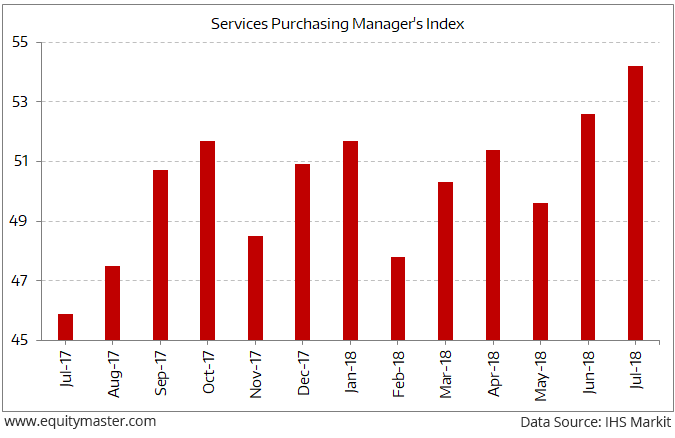After opening the day in green, share markets in India witnessed positive trading activity throughout the day and are presently trading above the dotted line. Sectoral indices are trading on a positive note with stocks in the banking sector and stocks in the pharma sector leading the gains.
The BSE Sensex is up by 275 points (up 0.8%) and the NSE Nifty is trading up by 84 points (up 0.7%). Meanwhile, the BSE Mid Cap index is trading up by 0.9%, while the BSE Small Cap index is trading up by 1%. The rupee is trading at 68.62 to the US$.
Moving on to news about the economy. India's services sector witnessed expansion in July at its fastest pace in nearly two years on better demand and new business orders.
India's dominant services industry activity showed signs of positivity as new business continued to increase. The country's predominant sector witnessed expansion, with new orders rising due to an improvement in overall operating conditions in the economy, according to the Nikkei Services Purchasing Managers' Index (PMI) survey by Markit.
The Services PMI is the reading of the country's services sector output and is updated monthly. A reading above 50 indicates expansion, while any score below the mark denotes contraction.
A strong rise in new business resulted in monthly increase in activity. The services PMI for July finished at 54.2, from 52.6 in April.
Services PMI Continues to Expand
On the price front, an uncertain global climate, currency weakness and a strong inflation may continue to put pressure on the central bank to hike interest rates over the coming months.
The data comes as the Reserve Bank of India's (RBI's) Monetary Policy Committee hiked repo rate by 25 basis points to 6.5% in its third bi-monthly monetary policy review of 2018-19.
This hike by RBI turns out to be a back to back interest rate increase. In its June policy meet, the rate-setting panel headed by Governor Urjit Patel raised repo rate by 25 basis points to 6.25%. Back then, that was the first rate increase since Narendra Modi came to power in May 2014.
The latest PMI data suggests that the recent surge in the price of oil, India's biggest import item, and a sharp weakness in the rupee will keep risks for inflation remain on the upside.
Moving on to news from . is in focus today after it was reported that the airline will be unable to fly beyond 60 days unless cost-cutting measures including pay cuts are put in place.
It was also reported that the airline has approached investment bankers again to help sell a stake in the carrier.
At the time of writing Jet Airways share price was trading down by 8%.
Air travel has recorded double-digit growth for 45 consecutive months, thanks to low fares, the addition of new flights/destinations, and overall growth in the economy.
What's foreseeable for India's aviation traffic in 2018 is some pressure on the back of the consistent rise in crude oil prices. Earlier this month, Brent crude oil briefly breached US$80 per barrel and touched its highest level since December 2014. Crude prices have been driven up by production curbs in OPEC nations and Russia, as well as by robust demand on the back of healthy global economic growth.
Oil prices are closely monitored by the Indian air carriers, as aviation turbine fuel is their single largest input cost. A sharp rise in the cost of fuel puts pressure on margins, and consequently an increase in air fares.
Although air travel is becoming the new normal, investors need to understand the industry dynamics before buying up aviation stocks.
This article was originally published in English at www.equitymaster.com
Read the complete Indian stock market update. For the terms of use, go here.

No comments:
Post a Comment